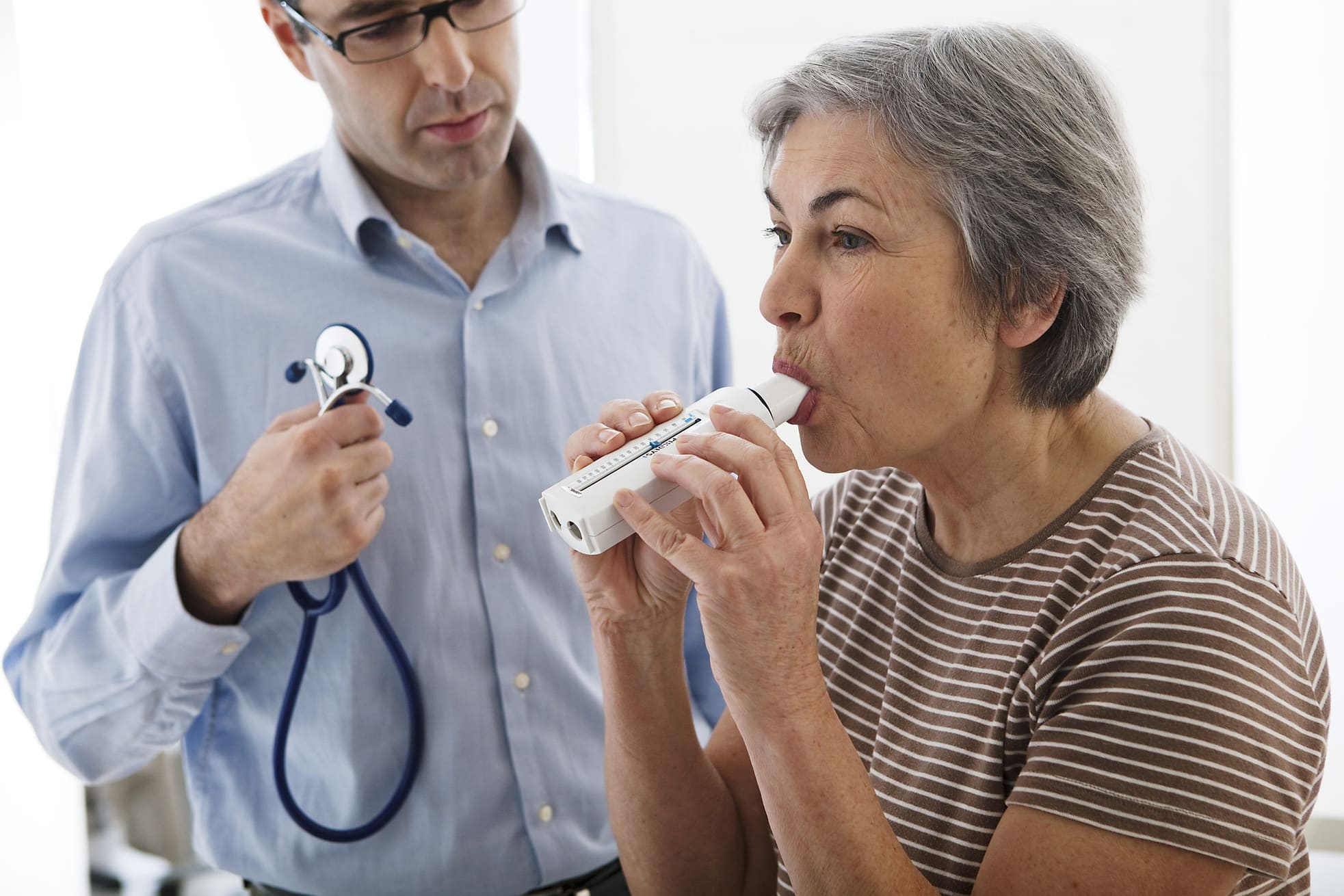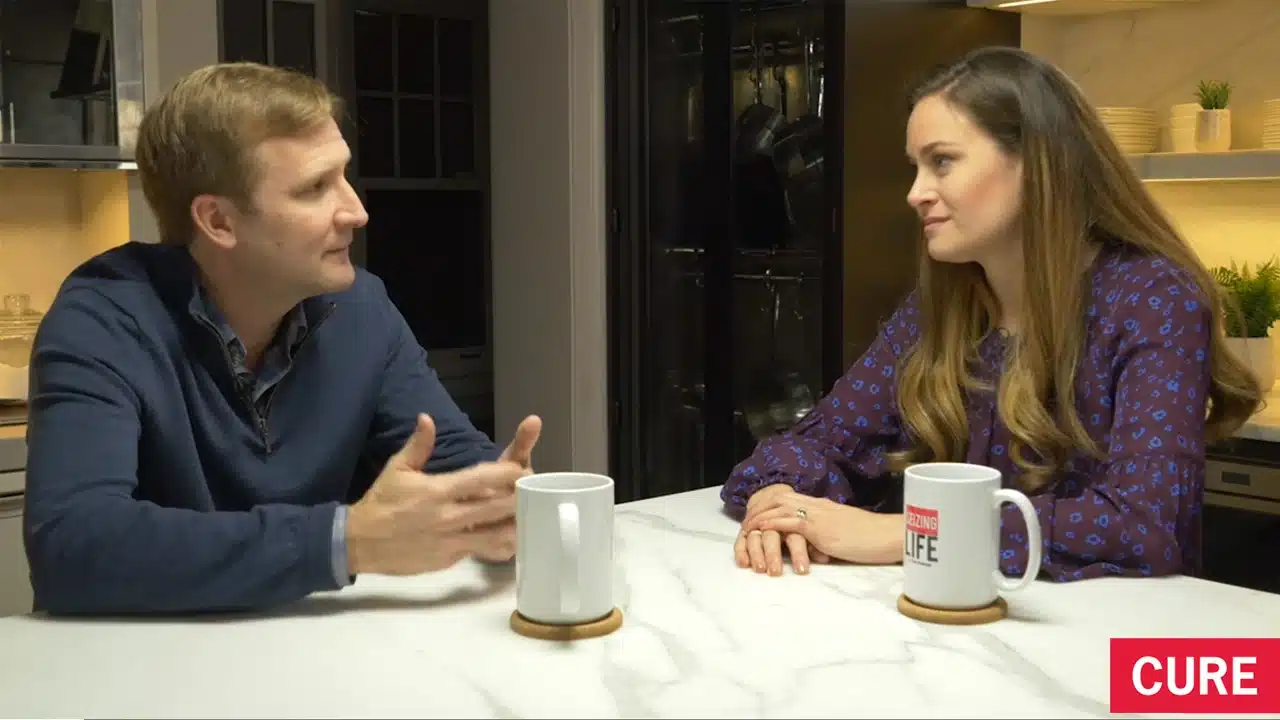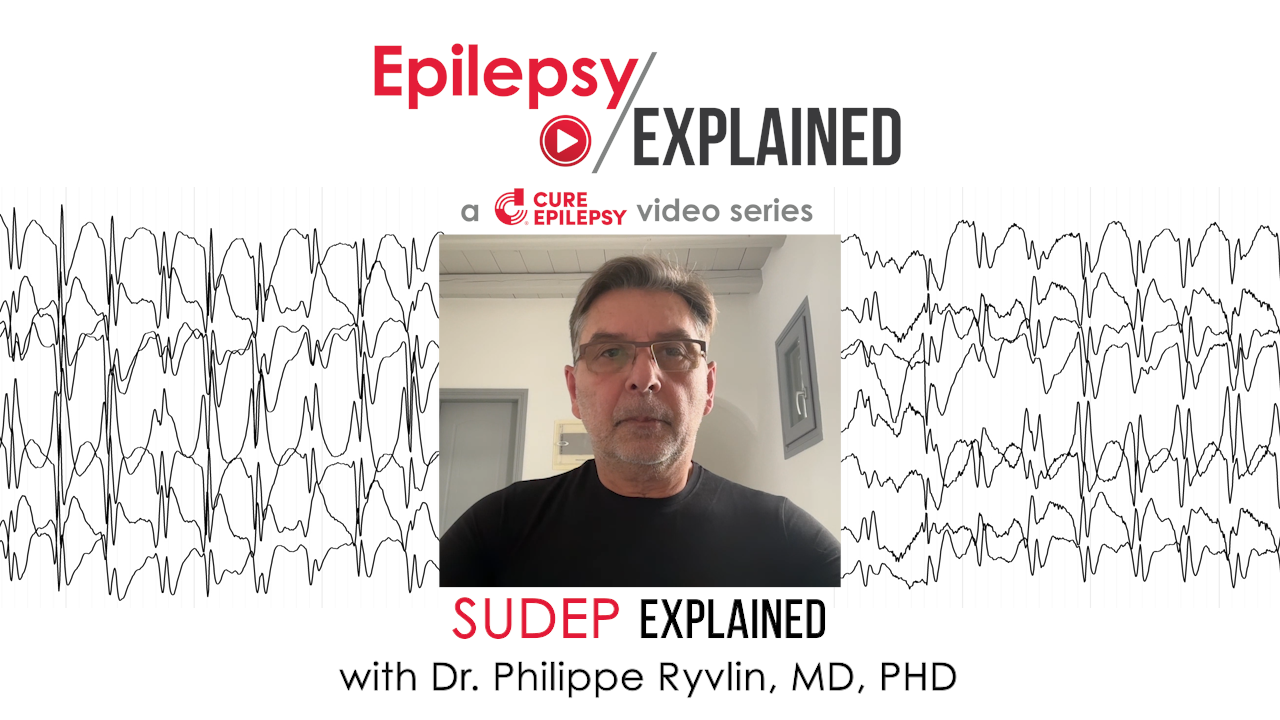< Back to Epilepsy Basics Forward to Diagnosing Epilepsy >
Table of Contents:
- What is SUDEP?
- SUDEP Research Initiative
- How many people suffer from SUDEP?
- What causes SUDEP?
- Risk factors for SUDEP
- Can SUDEP be prevented?
- SUDEP and Sleep
- Should I talk to my doctor about SUDEP?
- FAQ
- SUDEP Resources
What Is SUDEP?
SUDEP refers to the sudden, unexpected, witnessed, or unwitnessed, non-traumatic and non-drowning death in patients with epilepsy. It may be seen with or without evidence of a recent seizure and with no cause of death found on autopsy.
Sudden Death Syndrome (SDS)
Sudden Death Syndrome (SDS) encompasses sudden and unexplained deaths, primarily due to undiagnosed cardiac issues. It’s also called Sudden Cardiac Death (SCD).
SDS is often linked to underlying heart conditions, such as:
- Arrhythmias
- Hypertrophic cardiomyopathy
- Long QT syndrome
Key Differences Between SUDEP and SDS
- Neurological vs. Cardiac: SUDEP stems from epilepsy-related complications, while SDS arises from heart conditions.
- Risk Groups: SUDEP predominantly affects epilepsy patients, while SDS is more common in young athletes or individuals with undiagnosed cardiac conditions.
SUDEP Research Initiative
Since pioneering the first privately funded SUDEP research program 20 years ago, CURE Epilepsy has funded 40 grants for a total of $5.8M.
SUDEP InitiativeTotal Funding for SUDEP Research
Sorting Out SUDEP: Seeking The Causes, Finding Those At RiskHow many people suffer from Sudden Unexpected Death in Epilepsy (SUDEP)?
The exact number of people who suffer from Sudden Unexpected Death in Epilepsy (SUDEP) is difficult to determine due to various factors, including underreporting and differences in reporting criteria across different regions and healthcare systems.
However, it is estimated that over 3,000 people will die each year from SUDEP, and it can happen to anyone with epilepsy, although certain individuals are at a greater risk.
What Causes SUDEP?
The exact cause of Sudden Unexpected Death in Epilepsy (SUDEP) is still not fully understood, but researchers have identified several factors that may contribute to its occurrence:
- Seizures: SUDEP often occurs during or immediately after a seizure. Seizures can lead to changes in heart rhythm, breathing, and brain activity, which may increase the risk of sudden death.
- Respiratory Dysfunction: Seizures can interfere with normal breathing patterns, leading to respiratory dysfunction. This may include pauses in breathing (apnea) or difficulty in maintaining a regular breathing pattern, which can contribute to SUDEP.
- Cardiac Arrhythmias: Abnormalities in heart rhythm (arrhythmias) may occur during or after seizures, increasing the risk of sudden cardiac death. These arrhythmias can be triggered by the abnormal electrical activity in the brain during a seizure.
- Autonomic Dysfunction: Seizures can affect the autonomic nervous system, which controls vital functions such as heart rate, blood pressure, and breathing. Dysfunction in the autonomic nervous system during a seizure may predispose individuals to SUDEP.
- Brainstem Abnormalities: Some research suggests that abnormalities in the brainstem, which plays a crucial role in regulating vital functions, may contribute to the occurrence of SUDEP. These abnormalities may disrupt normal breathing and heart function during and after seizures.
Risk factors for SUDEP
While SUDEP can happen to anyone with epilepsy, some people are at higher risk than others. The most common risk factor for SUDEP is having more than three generalized tonic-clonic seizures per year (DeGiorgio et al., 2017).
- Other top risk factors include:
- Generalized tonic-clonic seizures
- Not taking medications as prescribed
- Early age of epilepsy onset
- Uncontrolled or frequent seizures
Can SUDEP Be Prevented?
Preventing Sudden Unexpected Death in Epilepsy (SUDEP) entirely is challenging due to its complex and multifactorial nature. However, there are steps that individuals with epilepsy can take to reduce their risk of experiencing SUDEP:
- Optimizing Seizure Management: Working closely with healthcare providers to achieve optimal seizure control through medication adjustments, lifestyle modifications, and regular monitoring can help reduce the risk of SUDEP. It’s essential for individuals with epilepsy to adhere to their prescribed treatment regimen and communicate any changes in seizure frequency or severity to their healthcare team promptly.
- Minimizing Seizure Triggers: Identifying and avoiding potential triggers for seizures, such as stress, sleep deprivation, alcohol, and certain medications, can help minimize seizure activity and lower the risk of SUDEP. Maintaining a healthy lifestyle, including regular sleep patterns, stress management techniques, and avoiding alcohol and drugs, can contribute to overall seizure control.
- Ensuring Medication Adherence: Consistent adherence to epilepsy medications is crucial for maintaining seizure control and reducing the risk of SUDEP. Individuals with epilepsy should work with their healthcare providers to address any barriers to medication adherence and develop strategies to promote compliance, such as pill organizers, reminder alarms, or medication synchronization programs.
- Creating a Safe Sleep Environment: Seizures that occur during sleep pose a particular risk for SUDEP. Creating a safe sleep environment, such as using bed rails or padding, sleeping on a firm mattress, and avoiding sleeping alone, can help reduce the risk of injury during seizures and facilitate prompt intervention if necessary.
- Regular Medical Follow-Up: Regular medical follow-up with healthcare providers, including neurologists or epileptologists, is essential for ongoing seizure management and monitoring for potential risk factors for SUDEP. Healthcare providers can assess seizure control, adjust medication regimens as needed, and provide guidance on minimizing risk factors for SUDEP.
While it may not be possible to prevent SUDEP entirely, implementing these preventive measures can help reduce the likelihood of experiencing SUDEP and improve overall outcomes for individuals living with epilepsy. It’s crucial for individuals with epilepsy and their caregivers to be proactive in managing the condition and advocating for their healthcare needs to minimize the risk of SUDEP.
SUDEP and Sleep
SUDEP (Sudden Unexpected Death in Epilepsy) and sleep are closely intertwined, as SUDEP often occurs during sleep or in the immediate aftermath of sleep. Several factors related to sleep may influence the risk of SUDEP:
- Increased Seizure Risk During Sleep: Many individuals with epilepsy experience seizures during sleep, particularly during certain stages of the sleep cycle. Seizures that occur during sleep may be more difficult to detect and manage, increasing the risk of complications such as SUDEP.
- Sleep Disordered Breathing: Sleep disorders, such as sleep apnea, are more common in individuals with epilepsy compared to the general population. Sleep apnea involves pauses in breathing during sleep, which can exacerbate respiratory dysfunction during seizures and increase the risk of SUDEP.
- Impaired Consciousness During Sleep: Seizures that occur during sleep may be associated with impaired consciousness, making it more difficult for individuals to respond appropriately to the seizure or seek assistance. This can delay intervention and increase the likelihood of adverse outcomes, including SUDEP.
- Medication Effects: Some medications used to treat epilepsy may affect sleep architecture or respiratory function, potentially increasing the risk of sleep-related complications, including SUDEP. It’s essential for individuals with epilepsy to work closely with their healthcare providers to optimize medication regimens and minimize potential side effects.
- Sleep Deprivation: Poor sleep quality or insufficient sleep may lower the seizure threshold and increase the likelihood of seizures, including those associated with SUDEP. Maintaining healthy sleep habits and addressing sleep disturbances are important aspects of epilepsy management.
Overall, the relationship between SUDEP and sleep highlights the importance of comprehensive epilepsy care, which includes addressing sleep-related issues, optimizing seizure management, and promoting adherence to treatment regimens. Individuals with epilepsy and their healthcare providers should collaborate to identify and address factors that may increase the risk of SUDEP, with a particular emphasis on optimizing sleep quality and safety.
Should I talk to my doctor about SUDEP?
It’s important to talk to your doctor about Sudden Unexpected Death in Epilepsy (SUDEP), especially if you or a loved one have epilepsy. Your doctor can provide valuable information and guidance about SUDEP, including risk factors, preventive measures, and ways to optimize seizure management.
Discussing SUDEP with your doctor allows you to:
- Understand Your Risk: Your doctor can assess your individual risk factors for SUDEP based on factors such as seizure type, frequency, and medication adherence. Understanding your risk can help you take proactive steps to reduce the likelihood of experiencing SUDEP.
- Receive Education and Counseling: Your doctor can provide you with information about SUDEP, including its causes, warning signs, and preventive strategies. Counseling and education about SUDEP can empower you to make informed decisions about your epilepsy management and lifestyle.
- Optimize Seizure Management: By discussing SUDEP with your doctor, you can work together to optimize your seizure management and treatment plan. This may involve adjusting medication dosages, exploring alternative treatment options, or addressing lifestyle factors that may contribute to seizures.
- Address Concerns and Anxiety: Talking to your doctor about SUDEP can help alleviate any concerns or anxiety you may have about the condition. Your doctor can offer reassurance, support, and resources to help you cope with the emotional impact of living with epilepsy.
- Develop a Safety Plan: Your doctor can help you develop a safety plan for managing seizures, especially those that occur during sleep. This may include implementing safety measures in your home, educating family members and caregivers about seizure first aid, and knowing when to seek emergency medical assistance.
Overall, discussing SUDEP with your doctor is an essential aspect of comprehensive epilepsy care. Open communication with your healthcare team can help you reduce your risk of SUDEP and improve your overall quality of life while living with epilepsy. Ensuring that epilepsy is well-controlled with a combination of medication, diet, and/or other therapeutic mechanisms is essential to decreasing the risk of SUDEP. If you have epilepsy, ask your doctor to discuss the risk of SUDEP with you. To find an epilepsy specialist near you, click here.
Related Content
Frequently Asked Questions (FAQs)
-
How common is SUDEP?
It is estimated that over 3,000 people will die each year from SUDEP and it can happen to anyone with epilepsy, although certain individuals are at a greater risk. While certain steps can be taken to reduce this risk, there is a critical need for continued SUDEP research to understand the underlying biological mechanisms in order to prevent SUDEP.
-
How often does SUDEP occur?
Two recent epidemiological studies have helped to shed more light on the rates of SUDEP. A 2017 American Academy of Neurology/American Epilepsy Society report that involved an extensive literature review found SUDEP to affect 1/4500 children with epilepsy and 1/1000 adults with epilepsy each year. In contrast, in an examination of SUDEP rates in a cohort of individuals with epilepsy gleaned from the Swedish National Death Registry, Sveinsson et al. found the rate of SUDEP to be 1.11/1000 children less than 16 years of age per year, 1.13/1000 in individuals aged 16-50 per year and 1.29/1000 in individuals over 50 each year. The most important thing to remember is that while the incidence of SUDEP can differ depending upon the population studied, it is greatest in individuals with poorly-controlled seizures.
-
Why does SUDEP happen?
It is not clear why SUDEP happens. Because SUDEP is thought to occur either during or following a seizure, it is possible that it is due to a problem with the person’s heart, or breathing during or following the seizure.
-
Who is at risk for SUDEP?
The greatest risk factor for SUDEP is having tonic-clonic seizures (also known as grand mal). There is also a higher risk for people who have night-time seizures. Missing medications or not taking seizure medicines as prescribed may also put people at higher risk for SUDEP, because it can lead to more seizures.
-
How often does SUDEP occur in children with epilepsy?
As with adults, the answer generally depends upon how severe the epilepsy is. Some studies have found that risks for SUDEP in children are lower than in adults (Leestma et al., 1997; Harden et al., 2017); however, recent evidence suggests that SUDEP may be as prevalent in children as it is in adults, with about 1.11 cases of SUDEP per 1000 children with epilepsy (Sveinsson et al., 2017; Keller et al., Neurology 2018).
-
Is SUDEP genetic?
There are some studies that suggest genetic factors play a role, with certain genes implicated in some SUDEP cases (Bagnall et al., 2017). Research investigating the genetic link to SUDEP is still ongoing
-
Can using an anti-suffocation pillow prevent SUDEP?
There is no concrete data to support using these pillows. A recent study found that although so-called “anti-suffocation” pillows may reduce the amount of inspired CO2 compared to conventional pillows (which would seemingly reduce the risk of asphyxia), the total amount of CO2 accumulated with “anti-suffocation” pillows may still reach life-threatening amounts (Catcheside et al., 2014). You may wish to discuss any possible benefits with your doctor.
-
Would using an audio monitoring device alert us to the possibility of SUDEP?
There are many types of devices out there that can alert seizures, alert changes in heart rate, or alert changes in breathing. Currently, no devices exist that can prevent SUDEP, however, there is some evidence that using a nighttime audio monitoring device may help inform of a major seizure event (Arends et al., 2016). However, research into the development of this technology is still ongoing.
-
Is it SUDEP if there was no evidence of a seizure?
The person must have a diagnosis of epilepsy for SUDEP to be considered. However, in SUDEP, the death may not be the direct result of a seizure. Although it is clear that a history of uncontrolled seizures increases the risk of SUDEP (DeGiorgio et al., 2017), the absence of evidence of a seizure prior to death does not preclude it from being deemed SUDEP.









